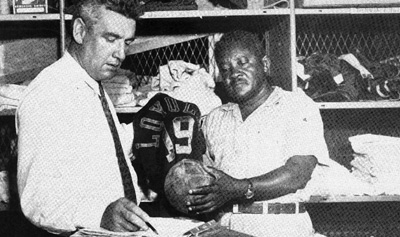His name was Sidney Wade, but everyone knew the athletic trainer as Tiger. For 39 years, Wade taped ankles, relegated athletes to the whirlpool and became a beloved campus figure.
Now, nearly 30 years after his death, Wade will become the first non-athlete or -coach to be inducted into the Loyola Athletic Hall of Fame in tomorrow’s ceremony.
In 1925, Loyola hired the 20 year old to maintain the gymnasium and help injured athletes, but according to those who knew him, he was much more: a friend and a cheerleader.
“He was a special guy,” said Erwin Caswell, class of ’56, who will speak for Wade during the induction ceremony.
Caswell arrived at Loyola with a leg injury that threatened his track scholarship, but with Wade’s help, the injury was healed for the spring track season.
“Thanks to Tiger Wade I was able to compete,” Caswell said. “He’d massage my sore leg, or wrap it tightly in bandages, and he really took care of it well.”
Everyone who spoke of Wade remembers him as a cheerful, kind man who was completely dedicated to Loyola’s athletes.
“He loved Loyola, and he especially loved the students,” said Lula Wade, Sidney’s widow. One of the saddest times of Wade’s life was when cancer forced him to stop working in 1964, she said.
Although Wade worked in the South before the Civil Rights Movement, he never complained of racism, said Felix Gaudin, Loyola’s sports archivist and former member of the 1948 to 1953 basketball team.
“He never, ever expressed any problems at Loyola or any [negative] response to him because he was a black man,” Gaudin said. “He was such a nice person; he never had a bad word to say about anyone. Everyone respected and loved him.”
Caswell agreed that Wade’s color had little impact on his effectiveness or the regard students had for him.
“I did not see his color or see him as a black man; I saw him as someone great who was there to help me,” Caswell said. “We all loved and admired the man, regardless of what color he was.”
Wade was a mysterious figure. Many athletes had no idea that he had “a wife of eight years and one ‘dependent,'” according to a Maroon article from 1956.
In fact, the Hall of Fame nominating committee had to employ a private investigator to locate his wife, who now lives in South Carolina.
Brett Simpson, director of sports information, said that although he never knew Wade personally, the memories of others were enough to convince him of Wade’s rightful place in the Hall of Fame.
“He had dedicated pretty much a lifetime of service to the university, and he is an endeared figure with guys of Loyola’s golden age of athletics,” Simpson said.
Caswell agreed. “We should’ve nominated him 10 years ago. He’s always deserved to be in.”
Kelly Brown can be reached at [email protected].








